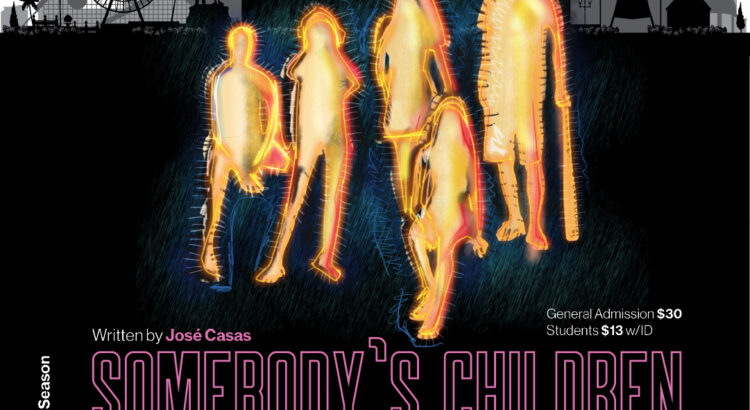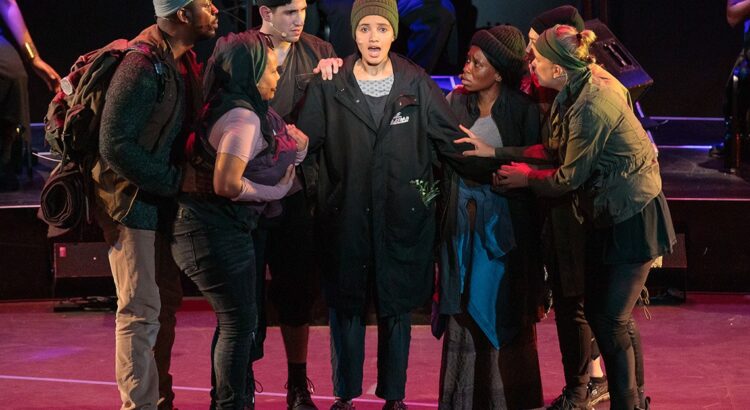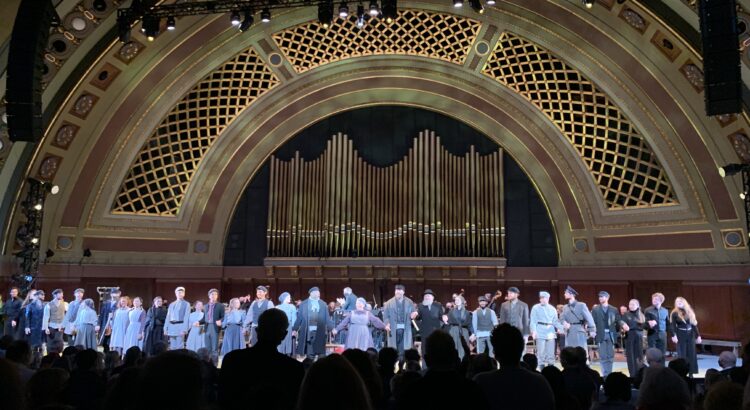Parable of the Sower… Where do I start?
I believe this was the first opera I’ve ever seen. And I was not disappointed. I laughed, cried, and even had the privilege to sing along. After the show, my friend Anna described Parable of the Sower as the best play she’d ever seen in her life. “I was tearing up basically the entire time… the music was consuming. It was so so fantastic,” she remarked.
The opera is based on the post-apocalyptic novel written by Octavia E. Butler, written by Toshi Reagon and Bernice Johnson Reagon. Despite being published in 1993, the story is set in 2024, eerily close to this year. Already, Butler starts to draw parallels. The play deals with a Christian-esque group in a world that faces environmental degradation on a grand, terrifying scale. The church members essentially live in Noah’s ark – their walled city is safe, while the outside world is gonna end. The Reverend – the main character’s father – is the only one who is allowed to leave the walls and see the city.
Up on the balcony, people chat as the clock ticks down to 4pm. There is a person onstage, already in character; the audience is left unsure of whether the show has already started or not. The lights don’t go down, the cast strolls in, unannounced, and the start just sort of happens.

Opening the play, Toshi Reagon tells us that Butler “burned [Lauren] with hyper empathy.” An element that I missed – until my fantasy worldbuilding class’ post-opera discussion – were Lauren’s magical powers. She feels others’ pain, and there are subtle cues – like a flash of purple when her brother stabs his hand with a pencil to get her attention, or her falling down as other people get shot – that several of my classmates pointed out. “If I can feel your pain, do I know you better, if I can fly in your joy?” Lauren asks.
The first scene is all auditory: two news channels chirp out overwhelming news, lapping over each other, in a volume-too-loud, ear-assaulting amalgam. This launches into a song, where the talents crooned at different directions of the audience, “What you gon’ do?” Even though I sat all the way up on the balcony, it felt like they were staring, arch-eyebrowed, right at us, and I felt a pang in my stomach. “The world’s on fire, you can’t hide.” The line between fiction and reality blurred once more.
In their situation: a “dystopian America wracked by the violence brought on by unrelenting greed and systemic injustice” (UMS blog), it all boils down to us versus them. There exists a religious dispute between Lauren and her father, the reverend, exploring the scale of beliefs ranging from God is good, God is change, to God have mercy. Lauren devises her own truth while others present the fixed truth that most of her family is invested in. She believes in the need to embrace change and do something different, because it’s only a matter of time before their safety crumbles down. “There’s a new world coming, everything gon’ be turning over,” Lauren sings. While others sing back, “do you really think the world gon’ end?”
I enjoyed how the cast encouraged audience interaction. I didn’t feel shy about bobbing my head, or tapping a foot. When a person in the audience clapped at the words being exchanged onstage, Toshi stopped mid-speech to say, “Hey, I won’t stop you.” Many times, a few people would let out whoops that soon launched the whole audience into applause. The actors had such a commanding presence; they were able to start the theater into a clap, with ease. They also played with breaking the fourth wall. “Octavia Butler is not playing with us,” Toshi remarked, after the first act. She directly asked the audience to naturally join into the chorus of the song – “Don’t let your baby go, don’t let your baby go to Olivar – ” and it was really beautiful to hear the audience participating. Everyone in that large room – those onstage and those spectating – felt more connected. I could feel them sowing the seeds of community with these little moments.
Every person onstage flaunted their flawless vocals, and the opera doesn’t feature one person too heavily; it feels like each character gets their own moment in the spotlight. I especially loved the electric guitar riffs, or when the guitarist would back a singer’s vocals, perfectly in sync with their inflections.
In the song with the chorus, “Are we supposed to live like this?”, the strings are beautiful and psychedelic; warpy, wonky. I appreciated how this broke my expectation of what an opera had to be: very classical, prim, and proper, with a soprano hitting notes that could break glass.
The songs that struck me the most were Lauren’s “Has anybody seen my father?” a heartbreaking, repeated chorus where her voice gradually breaks with each repetition, and the more mellow, emotional solo by Lauren’s mom. Both had such intimate lyrics that the theater flooded with it. It felt too heavy to move, or in any way disrupt this moment. I’ll admit that tears bubbled from my eyes, and I stiffly let them run, not even lifting a hand to break the mood.
True to an opera, the second act made me fall asleep. This isn’t to say that the show fell off, or that I was the only one slightly sleep-deprived. While the first half of the show had lights that never dimmed, the lighting was all of a sudden pitch-black dark, spotlights lightly glazing the characters as they entered the hellscape outside, complete with dangerous people and violent criminal elements. Because of the lighting, I couldn’t help feeling that maybe my ensuing drowsiness was purposeful, intentional. When I woke up, I realized we’d all been asleep while the characters were still fighting for their lives – belting through, by far, the most grueling song – through this continuous struggle outside of the wall. But for me, it all kind of turned to background noise, in the dark. As I took care not to wake up on my neighbor’s shoulder, UMS was playing with genre. At the end of the story, the troupe stands clustered together, in a haunting formation. Smoke floats over their heads, like angels, as they stand in ruin. After resting for a long while, the electric started back up, with gusto, and served as a wake-up alarm as multiple neighbors startled awake.

What I saw when I woke up
To finish, every seat in the house was in standing ovation. I was in awe of the amount of talent in the room, trying to digest it all. On the walk back, Toshi’s closing words circled through my head: “We have to fall away from the limitations billionaires have put on us. It will only happen if you give up the lives they have assigned us.” My friend Isabelle pointed out the liminality of how parables are passed – to my point about sleeping, there is a presence through absence. “Their words are gonna fall on people, stick with some, take hold, grow, and spread.” That is the power of the parable.
Read more about the performance here: https://ums.org/performance/parable-of-the-sower/











